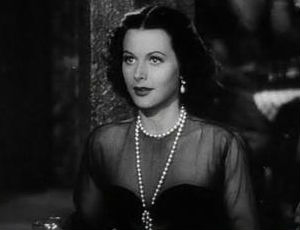Can't live without your cell phone? Can't imagine an evening without your remote? Thank Hedy Lamarr and George Antheil, the inventors of spread spectrum signaling who were more famous for other things. Hedy Lamarr was a Hollywood star most famous for Cecil B. DeMille's Samson and Delilah, a blockbuster in its day, and she was billed by Sam Goldwyn as "the most beautiful woman in the world." Not content with making her living via her looks and acting talent, she invented things in her spare time. When WWII swept up America, former Austrian Lamarr helped the war effort with secrets gleaned from her arms dealing, first husband's interminable dinner parties. Collaborating with Antheil, another exile of Hitler's Europe, Lamarr figured out how to remotely guide torpedoes without the signal being jammed by enemy radio operators. Neither she nor Antheil ever received any monetary profit from their invention, and Lamarr was only recognized for her contribution to the digital age in the 1990s.
George Antheil is best known now as a Modernist composer, but he was a bit of a polymath himself. To support himself and his family, he composed film music, wrote for Esquire, and was an amateur endocrinologist. He also wrote a bestselling memoir, Bad Boy of Music. If you want to hear some of his music on CD, CPL owns The Three String Quartets.
How do I know all this? I read Hedy's Folly, a compulsively readable account of Lamarr and Antheil's partnership and invention. Richard Rhodes is able to explain highly technical subjects in a way even a luddite like me can understand them, and at the same time keep the human story going. This book is also not terribly long, and could probably be finished in an evening. So, take your cell phone calls out into the lobby and thank your Hollywood stars for not having to leave the couch once you've popped Tortilla Flat into the DVD player.



Add a comment to: And What Do You Do In Your Spare Time, Miss Lamarr?